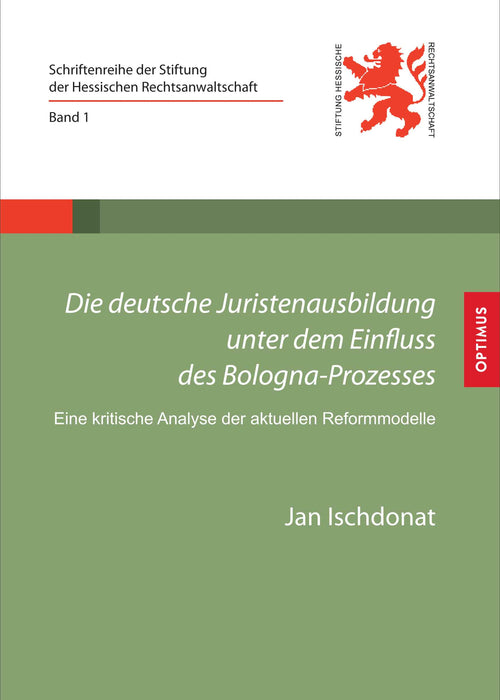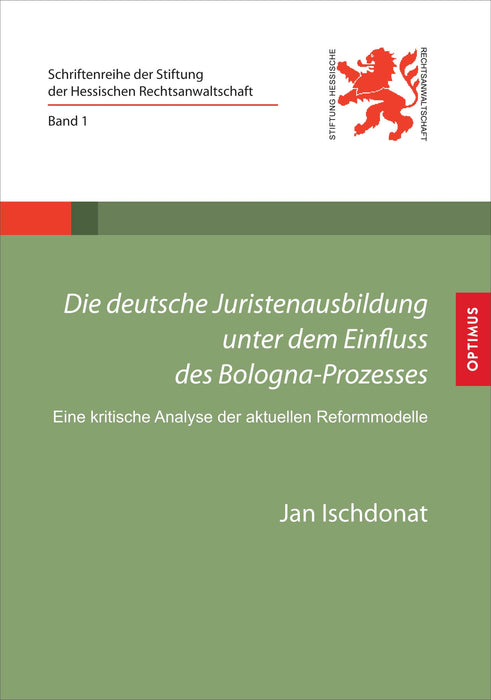Volume 01 | The German legal education under the influence of the Bologna process
- Brand: Dr. Mark C. Hilgard | Stiftung der Hessischen Rechtsanwaltschaft
- Availability: In stock
- SKU: 9783941274402
€26,90
Against the background of the Bologna process and based on current law studies, the work analyzes the current reform models for the introduction of a bachelor's/master's structure in German legal education. The reform proposals, which vary in detail, are systematized by means of a comparative overview and traced back to...
Against the background of the Bologna process and based on current law studies, the work analyzes the current reform models for the introduction of a bachelor's/master's structure in German legal education. The reform proposals, which vary in detail, are systematized by means of a comparative overview and traced back to the essential conceptual questions. In this way, the advantages and disadvantages of the different reform models can be examined in more detail. Finally, considerations on the reform of the legal traineeship are included.
Details
- Title: German legal education under the influence of the Bologna Process
- Subtitle: A critical analysis of the current reform models
- Author: Jan Ischdonat
- Series: Series of publications by the Hessian Bar Association
- Edition: 1st edition
- Band: 1
- Publisher: Foundation of the Hessian Lawyers' Association
- Reviewer: Prof. Dr. Joachim Zekoll, LL.M.
- Published: 1st edition 05/27/2010
- Subject: Law
- Product Type: Book (Hardcover)
- Product type: textbook
- Language: German
- Binding: Softcover (paperback)
- Dimensions: 21.0 x 14.8 cm (DIN A5)
- Scope: 94 pages
- Condition: New (wrapped in foil)
- Keywords: Training model, bachelor, Bologna, Bologna process, Germany, standardized lawyer, university reform, law studies, legal training, state legal examination, master, legal clerkship, reform model, state examination, preparatory service
Author
Jan Ischdonat was born in Hamburg in 1979. After graduating from high school in Hamburg, he studied law at the University of Passau. This was followed by the legal preparatory service and the second state examination in Berlin. Since 2008 he has been a doctoral student and research associate at the Goethe University in Frankfurt am Main (Chair of Prof. Dr. Brigitte Haar, LL.M.).
Table of Contents
- Introduction and investigation result
-
The Bologna process: goals, targets and successful implementation
I. Description of the Bologna process
II. Goals and specifications of the Bologna process
1. Goals of the Bologna process
2. Education policy specifications and means of achieving the goals
III. Previous implementation of the Bologna Process
IV. The discussion on the implementation of the Bologna Process in German legal training
3. Development of the discussion
4. (In)appropriateness of the goals and means of the Bologna Process for a reform of legal education?
a) The criticism
b) Opinion -
Models for implementing the Bologna Process in university legal training
V. The current training model
5. Description
6. Evaluation and criticism
a) Suitability for achieving the Bologna goals
b) Other evaluation and criticism
c) Summary: Additional reform goals
VI. The reform models with bachelor's/master's structure
7. Overview and comparative presentation of the reform models
a) Bachelor's degree
b) Master's degree
c) State examination
d) Summary: Interventions in the current training structure as reform measures
8.Evaluation and criticism
a) Suitability for achieving the Bologna and other reform goals
(1) Creation of easily understandable and comparable degrees
(2) Making the study system more flexible and differentiating career goals
(3) Promotion of mobility
(4) Increased professional qualification and professional skills (practicability)
(5) Broadening the range of application of the study
(6) Reducing the scope of the knowledge and shortening the total duration of the training
(7) Reducing the complexity of the knowledge and strengthening the Academic quality
(8) Consideration of course-related services
(9) Reduction in the importance of commercial revision courses
(10) Interim result
b) Necessity
c) Appropriateness (at the same time critical analysis of individual reform models)
(1) Designing a bachelor's degree
(2) Designing a master's degree
(3) Sticking to the state examination?
9 summary and e Own reform proposal: The 3+1+1 model
a) Description of the 3+1+1 model
b) Advantages of the model
c) Further details on the 3+1+1 model(1) Compulsory or optional master's degree?
(2) Mobility of students and teachers? -
Legal clerkship and career entry
VII. The current preparatory service
10. Representation
11. Evaluation and criticism
a) General training and professional skills
b) State examination
12. Reform goals and measures for the preparatory service
VIII Preparatory service according to the reform models
13. Comparative presentation of the reform models
14. Evaluation and criticism
a) Abolition of the state examination?
b) Increased career orientation through branch training or career entry phase?
IX. Own reform proposal and result - Appendix: Graphic representation of the training models
Downloads
.DRM: Digital Watermark
This eBook contains a digital watermark and is therefore personalized for you. If the eBook is passed on to third parties abusively, it is possible to trace it back to the source.
File format: PDF (Portable Document Format)
With a fixed page layout, the PDF is particularly suitable for specialist books with columns, tables and figures. A PDF can be displayed on almost all devices, but is only suitable to a limited extent for small displays (smartphone, e-reader).
System requirements:
PC/Mac: You can read this eBook with a PC or Mac. You need a PDF viewer - e.g. Adobe Reader.
eReader: This eBook can be read with (almost) all eBook readers. However, it is not compatible with the Amazon Kindle.
Smartphone/Tablet: Whether Apple or Android, you can read this eBook. You need a PDF viewer - e.g. Adobe Reader.
Buying eBooks from abroad
For tax law reasons we can sell eBooks just within Germany and Switzerland. Regrettably we cannot fulfill eBook orders from other countries.



